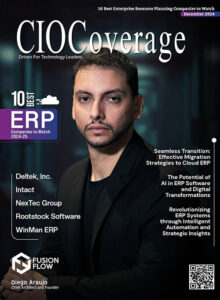 Enterprise Resource Planning (ERP) systems have long been the backbone of organizational operations, streamlining processes and fostering efficiency. However, the integration of Artificial Intelligence (AI) and predictive analysis into ERP platforms is ushering in a new era of intelligent and data-driven decision-making. This comprehensive article explores the transformative impact of AI and predictive analysis on ERP systems, providing an in-depth analysis of key technologies, benefits, challenges, and the future trajectory of this dynamic fusion.
Enterprise Resource Planning (ERP) systems have long been the backbone of organizational operations, streamlining processes and fostering efficiency. However, the integration of Artificial Intelligence (AI) and predictive analysis into ERP platforms is ushering in a new era of intelligent and data-driven decision-making. This comprehensive article explores the transformative impact of AI and predictive analysis on ERP systems, providing an in-depth analysis of key technologies, benefits, challenges, and the future trajectory of this dynamic fusion.
Enterprise Resource Planning (ERP) systems are undergoing a significant transformation, evolving beyond their traditional roles to become dynamic, intelligent platforms. This evolution is driven by the integration of AI, which introduces capabilities for automation, advanced analytics, and predictive modeling within ERP frameworks. In this section, we delve into the changing landscape of ERP systems and the pivotal role that AI plays in enhancing their functionality.
The Evolving Role of ERP Historically, ERP systems have functioned as repositories for organizational data, facilitating seamless communication and coordination across various departments. However, the increasing complexity of business operations and the growing volume of data have necessitated a shift towards more sophisticated solutions. The infusion of AI empowers ERP systems to not only manage data but also to analyze, interpret, and predict future trends, thereby fostering strategic decision-making.
The Pivotal Role of AI in ERP AI introduces a new dimension to ERP systems, offering capabilities such as automation, machine learning, and natural language processing. These technologies enable ERP platforms to evolve from static tools to intelligent systems capable of learning from data, adapting to changes, and providing actionable insights. The following subsections explore the multifaceted role of AI in enhancing ERP functionality.
Automation and Efficiency One of the primary contributions of AI to ERP is the automation of routine and time-consuming tasks. From data entry to invoice processing and inventory management, AI-driven automation streamlines operational processes, reducing manual intervention and minimizing the likelihood of errors. This not only enhances overall efficiency but also allows employees to focus on more strategic and value-added activities.
Intelligent Insights through Advanced Analytics AI facilitates advanced analytics within ERP systems, allowing organizations to extract valuable insights from their data. Machine learning algorithms can identify patterns, correlations, and anomalies in real-time, providing decision-makers with a deeper understanding of their business dynamics. The integration of intelligent insights into ERP workflows enables more informed decision-making, improving the organization’s ability to respond to challenges and capitalize on opportunities.
Predictive Analysis in ERP
In addition to AI, predictive analysis plays a crucial role in shaping the future of ERP systems. By leveraging historical data and advanced algorithms, predictive analysis empowers ERP platforms to anticipate future trends, enabling organizations to proactively address challenges and capitalize on emerging opportunities. This section explores the specific applications of predictive analysis within ERP systems.
Forecasting and Demand Planning One of the key advantages of predictive analysis in ERP is its ability to enhance forecasting accuracy. Traditional ERP systems rely on historical data for demand planning, often leading to suboptimal results. With predictive analysis, organizations can leverage advanced algorithms to analyze historical patterns, market trends, and external factors, resulting in more accurate demand forecasts. This, in turn, enables organizations to optimize inventory levels, reduce holding costs, and respond more effectively to fluctuations in demand.
Proactive Maintenance Strategies Predictive analysis is a game-changer for maintenance management within ERP systems. By analyzing data from equipment sensors, historical maintenance records, and external factors such as environmental conditions, organizations can implement proactive maintenance strategies. Predictive maintenance algorithms can identify potential equipment failures before they occur, allowing for timely interventions and minimizing unplanned downtime. This not only extends the lifespan of equipment but also reduces maintenance costs, contributing to overall operational efficiency.
Benefits of AI and Predictive Analysis in ERP
The integration of AI and predictive analysis into ERP systems brings about a multitude of benefits, positively impacting various aspects of organizational operations. In this section, we delve into these benefits, highlighting how the intelligent features of ERP systems contribute to enhanced decision-making, resource optimization, and operational agility.
Enhanced Decision-Making One of the primary advantages of AI-enhanced ERP systems is the ability to facilitate more informed and intelligent decision-making. Traditional ERP systems rely on historical data for decision support, limiting their ability to adapt to rapidly changing business environments. AI, on the other hand, empowers ERP platforms to analyze real-time data, identify patterns, and generate actionable insights. Decision-makers can leverage this intelligence to make more strategic and timely decisions, gaining a competitive edge in dynamic markets.
Improved Resource Allocation AI and predictive analysis contribute to optimized resource allocation within organizations. By forecasting demand with greater accuracy, ERP systems equipped with these technologies enable organizations to align their resources more effectively. This includes optimizing inventory levels, managing workforce allocation based on demand fluctuations, and ensuring efficient use of production capacities. Improved resource allocation leads to cost savings, reduced waste, and increased overall operational efficiency.
Increased Operational Agility Operational agility is a critical factor in the success of modern organizations, especially in industries characterized by rapid changes and uncertainties. AI-powered ERP systems enhance operational agility by providing real-time insights, enabling organizations to adapt swiftly to market changes and emerging trends. The ability to forecast demand, identify potential issues, and make data-driven decisions enhances an organization’s responsiveness, ensuring it remains competitive in dynamic business environments.
Challenges and Considerations
While the integration of AI and predictive analysis into ERP systems offers numerous advantages, it also presents challenges that organizations must address for successful implementation. This section explores key challenges and considerations, ranging from data quality to change management strategies.
Data Quality and Integration The effectiveness of AI and predictive analysis in ERP systems is highly dependent on the quality of the data available. Inaccurate or incomplete data can lead to unreliable predictions and suboptimal decision-making. Achieving high data quality requires organizations to invest in data cleansing processes, data governance frameworks, and seamless integration with various data sources. Ensuring a unified and accurate dataset is crucial for the success of AI-driven ERP implementations.
Change Management The integration of AI into ERP systems represents a significant shift in how organizations operate. It requires employees to adapt to new technologies, workflows, and decision-making processes. Successful implementation necessitates effective change management strategies, including communication plans, training programs, and support mechanisms. Organizations must address resistance to change, foster a culture of continuous learning, and ensure that employees are equipped with the necessary skills to leverage AI-enhanced ERP systems effectively.
Future Outlook
As technology continues to evolve, the future trajectory of AI and predictive analysis in ERP systems holds immense promise. This section explores potential advancements, emerging technologies, and the evolving landscape of intelligent enterprise solutions.
AI and Machine Learning Advancements Ongoing advancements in AI and machine learning will undoubtedly enhance the capabilities of ERP systems. Future iterations of AI algorithms will be more sophisticated, capable of processing larger datasets, and providing even more accurate predictions. Continuous learning models will enable ERP systems to adapt to evolving business environments, ensuring that organizations have access to the most relevant and timely insights for decision-making.
Integration with Emerging Technologies The synergy between AI-powered ERP systems and emerging technologies is set to redefine the landscape of enterprise solutions. Integration with technologies such as blockchain and the Internet of Things (IoT) holds the potential to unlock new dimensions of efficiency, transparency, and security. Blockchain, with its decentralized and tamper-resistant nature, can enhance data integrity within ERP systems, while IoT devices can provide real-time data streams, enriching predictive analytics capabilities.
Ethical Considerations and Responsible AI As AI becomes more ingrained in ERP systems, organizations must grapple with ethical considerations and the responsible use of AI. Issues such as bias in algorithms, data privacy, and the societal impact of AI-driven decisions require careful consideration. Future developments in AI-powered ERP systems will likely be accompanied by increased attention to ethical guidelines, regulatory frameworks, and responsible AI practices to ensure the technology is harnessed for the greater good.
The convergence of AI and predictive analysis with ERP systems marks a paradigm shift in how organizations leverage technology for decision-making and operational efficiency. The journey from traditional ERP systems to intelligent, data-driven platforms is not without its challenges, but the benefits far outweigh the obstacles. As organizations embrace these advancements, they position themselves to thrive in an era where intelligent, data-driven insights are paramount to success in a rapidly evolving business landscape. The continued evolution of AI and its integration with ERP systems will shape the future of enterprise solutions, enabling organizations to navigate complexity, make informed decisions, and stay agile in an ever-changing business environment.
















Your blog posts always leave me feeling motivated and empowered.
Comments are closed.